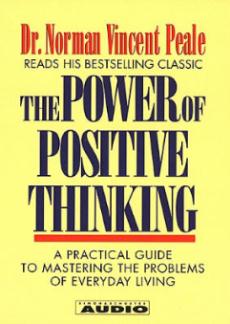.
.
.
Fifteen or so years ago my Yoga group gathered to hear a teacher from India talk about the meditative life. In the question and answer period following his talk, one of my friends asked him, “Do we get sick because we pay too little attention to our bodies, or because we pay too much attention.” He answered, “I think we get sick because there are germs.”
With saccharine terrorism Mr. [Norman Vincent] Peale refuses to allow his followers to hear, speak or see any evil. For him real human suffering does not exist; there is no such thing as murderous rage, suicidal despair, cruelty, lust, greed, mass poverty, or illiteracy. All these things he would dismiss as trivial mental processes which will evaporate if thoughts are simply turned into more cheerful channels (1).
I remember my father discussing Norman Vincent Peale’s ‘50s ideas in a sermon, not saying they were wrong but they ignored the realities of human existence. He based his negative evaluation of “positive thinking” on the obvious nature of “sin.” For my purposes here, I will use the word “violence” instead of “sin.”
Violence, that is events or situations we either cannot comprehend or that give us pain or discomfort we may or may not cause ourselves, begins with the implosion of stars and continues through to the invasion of our bodies by germs. It’s a fact of existence. My existence or the Milky Way’s.
If violence is part of existence, asking if violence is evil or benign is pointless. Philosophers/ theologians, beginning with Plato, “argued against the proposition that god had agency in evil.” By this argument god has nothing to with the creation of violence, so it is neither good nor evil. It simply is. Therefore, if god has nothing to do with what we perceive as evil, “suffering, poverty, illness and even death were not evils at all, but indifferents” (2).
If all of these “evils”—“suffering, poverty, illness and even death”—are part of the natural world, if they are “indifferents,” then, I should think, our reaction to them is properly courageous acceptance. We get sick because there are germs, because we fail to understand and not because the world is evil.
Mental health has two dimensions—absence of mental illness and presence of a well-adjusted personality. . . Ability to take responsibility for one’s own actions, flexibility, high frustration tolerance, acceptance of uncertainty. . . serenity to accept the things which we cannot change, courage to change the things which we can change, the wisdom to know the difference . . . acceptance of handicaps, tempered self-control, harmonious relationships to self, others, including Nature and God, are the essential features of mental health (3).
One is mentally healthy if one has “high frustration tolerance, acceptance of uncertainty. . . acceptance of handicaps. . . [and] harmonious relationship(s).” Verghese has asserted (and he is certainly not alone or particularly innovative in his thinking) that “spirituality” and “mental health” go hand in hand.
Spirituality . . . involves belief and obedience to an all powerful force usually called God, who controls the universe and the destiny of man. It involves the ways in which people fulfill what they hold to be the purpose of their lives, a search for the meaning of life and a sense of connectedness to the universe (4).
This seems to me—admittedly one who does not have high frustration tolerance, acceptance of uncertainty, tempered self-control, or bunches of harmonious relationships—akin to the Power of Positive Thinking. We are mentally and spiritually healthy if our thinking finds the “purpose of our lives” rather than simply trying to be present to the fact that there are germs.
I’m going to die. I know that. I expect that. I am on the one hand terrified about it and on the other aware it’s the meaning of my life. First one and then the other. Day in and day out. There are germs.
I heard on NPR the other day a discussion of the discovery of the nematode worm 3.6 kilometers beneath the earth’s surface in gold mines in the Witwatersrand basin near Johannesburg, South Africa.
The creatures seem to live in water squeezed between the mines’ rocks, can tolerate temperatures reaching 43 °C and feed off bacteria. Carbon dating of compounds dissolved in the water suggests that the worms have been living at these depths for between 3000 and 12,000 years (5).
These worms, living in these conditions bring the biologists (somehow) to the understanding there could be the same kind of life on Mars. The discovery also (somehow) brings some scientists who believe in Creationism via the “Intelligent Design” theory to proclaim the worms support their spirituality.
There are germs and there are worms.
“Multiple accounts of the effects of positive mood on judgment suggest that positive beliefs and states decrease the quality of attention to information, in general, and to negative information” in particular. We are bombarded with “motivations to maintain a positive mood, and information that the environment is safe [God’s in charge] and one can relax vigilance to negative information” (6).
I assume I’ve experienced the existence of germs many times (colds, measles, chicken pox, and Erysipelas—which I contracted by lack of vigilance to negative information) although I would be hard pressed to prove it. I’ve never seen a germ or a nematode worm.
My Yoga friend, trying to find the most positive way to think about illness, wanted to avoid attention to the (perhaps) negative information that there are germs. And the Intelligent Design folks use the discovery of a bunch of worms as evidence of their positive world-view (7).
Nematode worms probably have nothing to do with my argument. However, the reaction of the ID community is the kind of belief in “the information that the environment is safe and one can relax” that results in the Power of Positive Thinking. Stars implode, nematode worms live where nothing should be able to, and I carry the streptococcus bacteria of Erysipelas around with me, but, Dr. Peale might say, all is positive.
What I hope for in the midst of all of this is the courage to accept reality. I don’t equate acceptance with endurance. I say with Dylan Thomas, “Do not go gentle into that good night.” Acceptance is more than endurance.
According to Aristotle endurance is always subservient to courage and is evaluated in light of its relationship to knowledge of what is good: “The courageous man then is he that endures or fears the right things and for the right purpose and in the right manner and at the right time and who shows confidence in a similar way” (8).
My Positive Thinking has no Power. There are germs. Accepting that is not negative. It is (I trust) courage for the right things for the right purposes at the right time.
_______________
(1) Murphy RC Jr. “Think right: Reverend Peale’s panacea.” The Nation 19 (1955), 390-400. Quoted in Aspinwall, Lisa G., and Richard G. Tedeschi. “The Value of Positive Psychology for Health Psychology: Progress and Pitfalls in Examining the Relation of Positive Phenomena to Health.” Annals of Behavioral Medicine 39.1 (2010): 11.
(2) Kloppenborg, John S. “James 1:2-15 and Hellenistic Psychagogy.” Novum Testamentum 52.1 (2010): 67.
(3) Verghese, Abraham. “Spirituality and mental health.” Indian Journal of Psychiatry 50.4 (2008): 234.
(4) Verghese, 233.
(5) Iovino, Zena. “Gold-mine worm shows animals could be living on Mars.” Environment. New Scientist. 02 June 2011. Web. 06 Jun. 2011.
(6) Aspinwall, 8.
(7) See: “Nematode worm found in gold mine sparks new hope for extraterrestrial life.” Uncommon Descent: Serving the Intelligent Design Community. 2 June 2011. Web. 6 June 2011. The story comments about the discovery of the worms in language that I, frankly, cannot comprehend.
(8) Kloppenporg, 236.



Ironic that the Creationists and ID’s trumpet the findings of science when they support their ideas. Somehow they miss the overarching reality that the science they currently are appealing to has tried their ideas and found them to be something other than science.
LikeLike
By: Jim Hopkins on 06/06/2011
at 2:06 PM